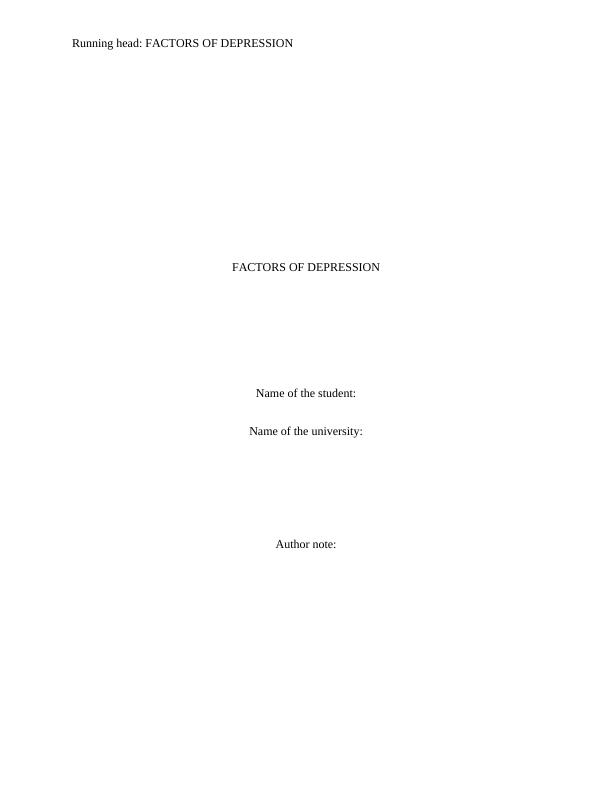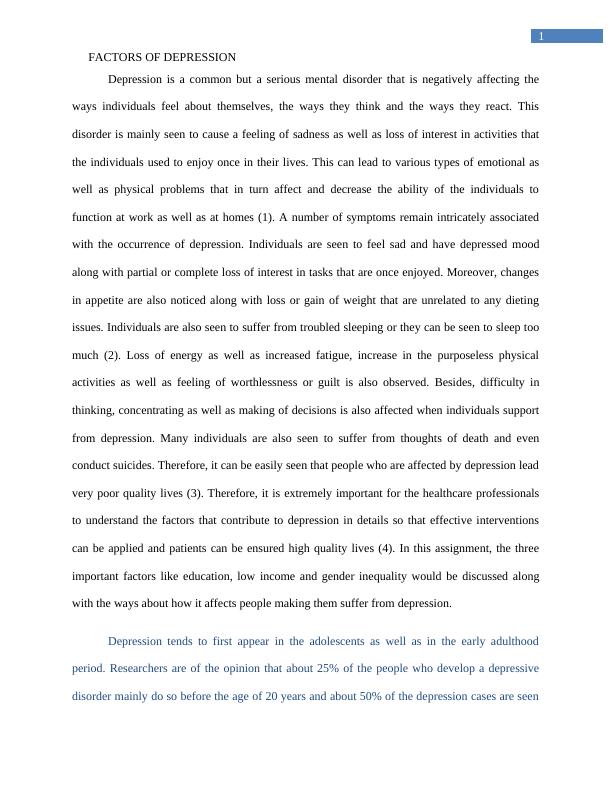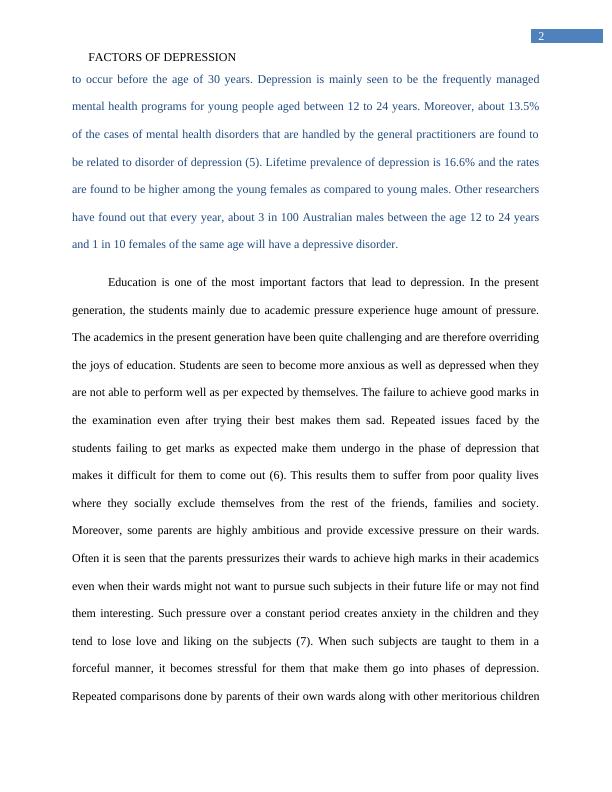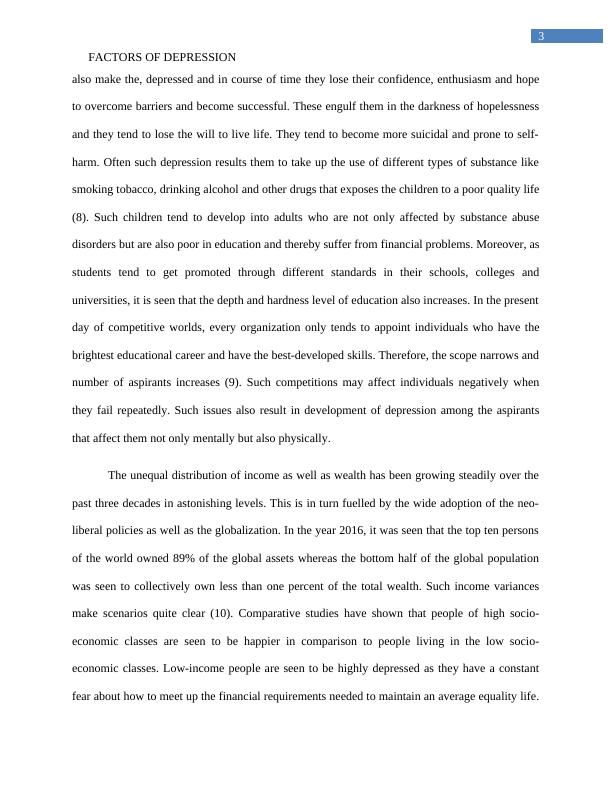Factors of Depression: Education, Low Income, and Gender Inequality
Added on 2023-06-10
12 Pages3588 Words452 Views
Running head: FACTORS OF DEPRESSION
FACTORS OF DEPRESSION
Name of the student:
Name of the university:
Author note:
FACTORS OF DEPRESSION
Name of the student:
Name of the university:
Author note:

1
FACTORS OF DEPRESSION
Depression is a common but a serious mental disorder that is negatively affecting the
ways individuals feel about themselves, the ways they think and the ways they react. This
disorder is mainly seen to cause a feeling of sadness as well as loss of interest in activities that
the individuals used to enjoy once in their lives. This can lead to various types of emotional as
well as physical problems that in turn affect and decrease the ability of the individuals to
function at work as well as at homes (1). A number of symptoms remain intricately associated
with the occurrence of depression. Individuals are seen to feel sad and have depressed mood
along with partial or complete loss of interest in tasks that are once enjoyed. Moreover, changes
in appetite are also noticed along with loss or gain of weight that are unrelated to any dieting
issues. Individuals are also seen to suffer from troubled sleeping or they can be seen to sleep too
much (2). Loss of energy as well as increased fatigue, increase in the purposeless physical
activities as well as feeling of worthlessness or guilt is also observed. Besides, difficulty in
thinking, concentrating as well as making of decisions is also affected when individuals support
from depression. Many individuals are also seen to suffer from thoughts of death and even
conduct suicides. Therefore, it can be easily seen that people who are affected by depression lead
very poor quality lives (3). Therefore, it is extremely important for the healthcare professionals
to understand the factors that contribute to depression in details so that effective interventions
can be applied and patients can be ensured high quality lives (4). In this assignment, the three
important factors like education, low income and gender inequality would be discussed along
with the ways about how it affects people making them suffer from depression.
Depression tends to first appear in the adolescents as well as in the early adulthood
period. Researchers are of the opinion that about 25% of the people who develop a depressive
disorder mainly do so before the age of 20 years and about 50% of the depression cases are seen
FACTORS OF DEPRESSION
Depression is a common but a serious mental disorder that is negatively affecting the
ways individuals feel about themselves, the ways they think and the ways they react. This
disorder is mainly seen to cause a feeling of sadness as well as loss of interest in activities that
the individuals used to enjoy once in their lives. This can lead to various types of emotional as
well as physical problems that in turn affect and decrease the ability of the individuals to
function at work as well as at homes (1). A number of symptoms remain intricately associated
with the occurrence of depression. Individuals are seen to feel sad and have depressed mood
along with partial or complete loss of interest in tasks that are once enjoyed. Moreover, changes
in appetite are also noticed along with loss or gain of weight that are unrelated to any dieting
issues. Individuals are also seen to suffer from troubled sleeping or they can be seen to sleep too
much (2). Loss of energy as well as increased fatigue, increase in the purposeless physical
activities as well as feeling of worthlessness or guilt is also observed. Besides, difficulty in
thinking, concentrating as well as making of decisions is also affected when individuals support
from depression. Many individuals are also seen to suffer from thoughts of death and even
conduct suicides. Therefore, it can be easily seen that people who are affected by depression lead
very poor quality lives (3). Therefore, it is extremely important for the healthcare professionals
to understand the factors that contribute to depression in details so that effective interventions
can be applied and patients can be ensured high quality lives (4). In this assignment, the three
important factors like education, low income and gender inequality would be discussed along
with the ways about how it affects people making them suffer from depression.
Depression tends to first appear in the adolescents as well as in the early adulthood
period. Researchers are of the opinion that about 25% of the people who develop a depressive
disorder mainly do so before the age of 20 years and about 50% of the depression cases are seen

2
FACTORS OF DEPRESSION
to occur before the age of 30 years. Depression is mainly seen to be the frequently managed
mental health programs for young people aged between 12 to 24 years. Moreover, about 13.5%
of the cases of mental health disorders that are handled by the general practitioners are found to
be related to disorder of depression (5). Lifetime prevalence of depression is 16.6% and the rates
are found to be higher among the young females as compared to young males. Other researchers
have found out that every year, about 3 in 100 Australian males between the age 12 to 24 years
and 1 in 10 females of the same age will have a depressive disorder.
Education is one of the most important factors that lead to depression. In the present
generation, the students mainly due to academic pressure experience huge amount of pressure.
The academics in the present generation have been quite challenging and are therefore overriding
the joys of education. Students are seen to become more anxious as well as depressed when they
are not able to perform well as per expected by themselves. The failure to achieve good marks in
the examination even after trying their best makes them sad. Repeated issues faced by the
students failing to get marks as expected make them undergo in the phase of depression that
makes it difficult for them to come out (6). This results them to suffer from poor quality lives
where they socially exclude themselves from the rest of the friends, families and society.
Moreover, some parents are highly ambitious and provide excessive pressure on their wards.
Often it is seen that the parents pressurizes their wards to achieve high marks in their academics
even when their wards might not want to pursue such subjects in their future life or may not find
them interesting. Such pressure over a constant period creates anxiety in the children and they
tend to lose love and liking on the subjects (7). When such subjects are taught to them in a
forceful manner, it becomes stressful for them that make them go into phases of depression.
Repeated comparisons done by parents of their own wards along with other meritorious children
FACTORS OF DEPRESSION
to occur before the age of 30 years. Depression is mainly seen to be the frequently managed
mental health programs for young people aged between 12 to 24 years. Moreover, about 13.5%
of the cases of mental health disorders that are handled by the general practitioners are found to
be related to disorder of depression (5). Lifetime prevalence of depression is 16.6% and the rates
are found to be higher among the young females as compared to young males. Other researchers
have found out that every year, about 3 in 100 Australian males between the age 12 to 24 years
and 1 in 10 females of the same age will have a depressive disorder.
Education is one of the most important factors that lead to depression. In the present
generation, the students mainly due to academic pressure experience huge amount of pressure.
The academics in the present generation have been quite challenging and are therefore overriding
the joys of education. Students are seen to become more anxious as well as depressed when they
are not able to perform well as per expected by themselves. The failure to achieve good marks in
the examination even after trying their best makes them sad. Repeated issues faced by the
students failing to get marks as expected make them undergo in the phase of depression that
makes it difficult for them to come out (6). This results them to suffer from poor quality lives
where they socially exclude themselves from the rest of the friends, families and society.
Moreover, some parents are highly ambitious and provide excessive pressure on their wards.
Often it is seen that the parents pressurizes their wards to achieve high marks in their academics
even when their wards might not want to pursue such subjects in their future life or may not find
them interesting. Such pressure over a constant period creates anxiety in the children and they
tend to lose love and liking on the subjects (7). When such subjects are taught to them in a
forceful manner, it becomes stressful for them that make them go into phases of depression.
Repeated comparisons done by parents of their own wards along with other meritorious children

3
FACTORS OF DEPRESSION
also make the, depressed and in course of time they lose their confidence, enthusiasm and hope
to overcome barriers and become successful. These engulf them in the darkness of hopelessness
and they tend to lose the will to live life. They tend to become more suicidal and prone to self-
harm. Often such depression results them to take up the use of different types of substance like
smoking tobacco, drinking alcohol and other drugs that exposes the children to a poor quality life
(8). Such children tend to develop into adults who are not only affected by substance abuse
disorders but are also poor in education and thereby suffer from financial problems. Moreover, as
students tend to get promoted through different standards in their schools, colleges and
universities, it is seen that the depth and hardness level of education also increases. In the present
day of competitive worlds, every organization only tends to appoint individuals who have the
brightest educational career and have the best-developed skills. Therefore, the scope narrows and
number of aspirants increases (9). Such competitions may affect individuals negatively when
they fail repeatedly. Such issues also result in development of depression among the aspirants
that affect them not only mentally but also physically.
The unequal distribution of income as well as wealth has been growing steadily over the
past three decades in astonishing levels. This is in turn fuelled by the wide adoption of the neo-
liberal policies as well as the globalization. In the year 2016, it was seen that the top ten persons
of the world owned 89% of the global assets whereas the bottom half of the global population
was seen to collectively own less than one percent of the total wealth. Such income variances
make scenarios quite clear (10). Comparative studies have shown that people of high socio-
economic classes are seen to be happier in comparison to people living in the low socio-
economic classes. Low-income people are seen to be highly depressed as they have a constant
fear about how to meet up the financial requirements needed to maintain an average equality life.
FACTORS OF DEPRESSION
also make the, depressed and in course of time they lose their confidence, enthusiasm and hope
to overcome barriers and become successful. These engulf them in the darkness of hopelessness
and they tend to lose the will to live life. They tend to become more suicidal and prone to self-
harm. Often such depression results them to take up the use of different types of substance like
smoking tobacco, drinking alcohol and other drugs that exposes the children to a poor quality life
(8). Such children tend to develop into adults who are not only affected by substance abuse
disorders but are also poor in education and thereby suffer from financial problems. Moreover, as
students tend to get promoted through different standards in their schools, colleges and
universities, it is seen that the depth and hardness level of education also increases. In the present
day of competitive worlds, every organization only tends to appoint individuals who have the
brightest educational career and have the best-developed skills. Therefore, the scope narrows and
number of aspirants increases (9). Such competitions may affect individuals negatively when
they fail repeatedly. Such issues also result in development of depression among the aspirants
that affect them not only mentally but also physically.
The unequal distribution of income as well as wealth has been growing steadily over the
past three decades in astonishing levels. This is in turn fuelled by the wide adoption of the neo-
liberal policies as well as the globalization. In the year 2016, it was seen that the top ten persons
of the world owned 89% of the global assets whereas the bottom half of the global population
was seen to collectively own less than one percent of the total wealth. Such income variances
make scenarios quite clear (10). Comparative studies have shown that people of high socio-
economic classes are seen to be happier in comparison to people living in the low socio-
economic classes. Low-income people are seen to be highly depressed as they have a constant
fear about how to meet up the financial requirements needed to maintain an average equality life.

End of preview
Want to access all the pages? Upload your documents or become a member.
Related Documents
Management of Depression through Social Approaches and Community Developmentlg...
|19
|5116
|74
Strength Based Nursing Approach for Major Clinical Depression Disorder in Australialg...
|9
|2403
|33
Depression in Youth: Statistics, Causes, Symptoms and Interventionslg...
|12
|1327
|85
Bio-Psychological Factors Contributing to Depression: Nursing Interventions and Ethical Implicationslg...
|9
|2829
|414
Depression: Symptoms, Causes and Factors Contributing to Depression in Adult Menlg...
|8
|2752
|339
Counseling Theories for Treating Depressionlg...
|11
|3300
|82